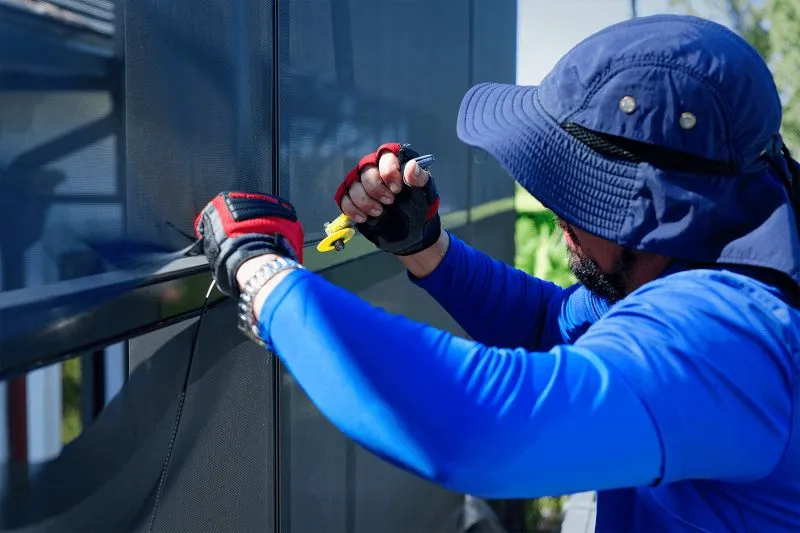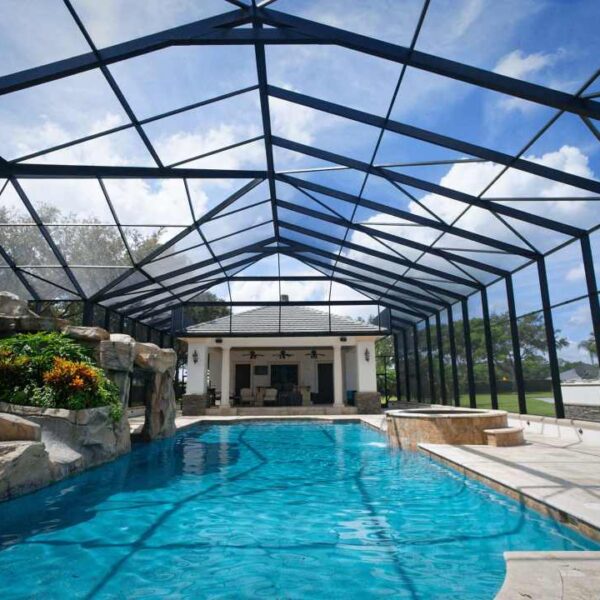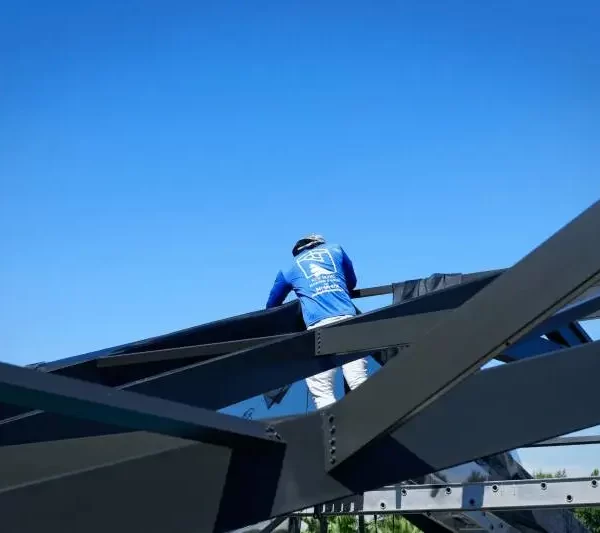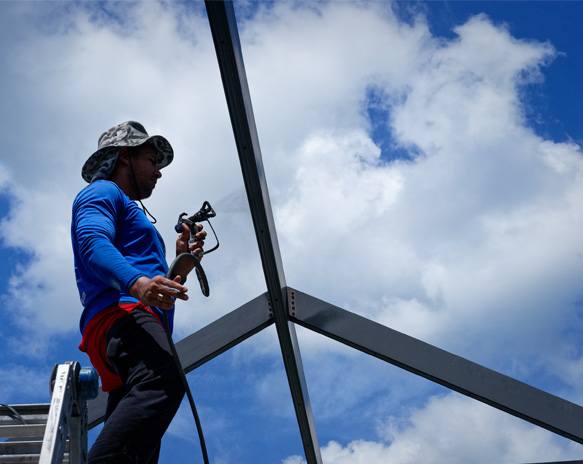
Maintaining Your Pool Screen Enclosure for Longevity
Protect and preserve your outdoor enclosure with ease.
A pool screen enclosure is more than just a protective barrier. It is a key component of your outdoor living space, enhancing your pool experience while protecting you from debris, insects, and harsh weather.
However, like any other part of your home, it requires regular maintenance to ensure its longevity.
This guide will provide you with practical tips and advice on maintaining your pool screen for longevity. From routine cleaning to minor repairs, we’ll cover everything you need to know to keep your pool screen in top shape.
So, whether you have a pool cage screen, a screen house over your pool, or a pool lanai screen, let’s dive in and learn how to protect your investment.
Understanding Pool Screen Enclosure
Pool screen enclosures serve multiple purposes. They protect the pool area from unwanted pests and reduce debris accumulation in the pool.
It is important to understand how these enclosures work in order to maintain them properly. Learning about the materials and structure will empower you to manage them confidently and prolong their lifespan.
Types of Pool Screen Enclosures
There are several types of enclosures, each offering unique benefits. Knowing the differences helps you make informed maintenance choices.
- Pool Cage Screens: Enclose the entire pool area.
- Screen House Over Pool: Provides a shaded space.
- Pool Lanai Screen: Creates an extended living area.
Each type demands specific care to maintain their unique functionalities.
Benefits of a Well-Maintained Pool Screen
Keeping your pool screen in top condition offers numerous advantages. It enhances the aesthetics of your outdoor space and increases property value.
Furthermore, a well-maintained screen provides excellent insect protection. It also reduces the cleaning efforts needed for the pool itself. Ultimately, investing time in maintenance makes your pool area more enjoyable year-round.
Routine Cleaning and Maintenance
Regular cleaning is essential for maintaining your pool screen’s appearance and function. A consistent maintenance routine prevents mold and mildew buildup.
To start, gather the necessary cleaning supplies. A gentle detergent and a soft brush work best for most screens. Avoid harsh chemicals as they can degrade the screen material.
Here are steps to effectively clean your pool screen:
- Rinse the screen with water to remove loose dirt.
- Mix mild detergent with water in a bucket.
- Apply the solution with a soft brush, scrubbing gently.
- Rinse thoroughly to avoid soap residue.
- Let the screens dry naturally for best results.
Ensuring cleanliness can significantly extend the life of your pool enclosure.
Cleaning Your Pool Screen Mesh
When cleaning the pool screen mesh, focus on removing debris first. Using a garden hose, start from the top and work your way down.
Apply a gentle mix of detergent and water, scrubbing softly to avoid damaging the fibers. Rinse completely to clear all detergent residues from the mesh. Allow the mesh to dry thoroughly, which helps prevent mold growth.
Inspecting for Damage
Regular inspections are crucial for detecting early signs of wear. Check for any tears, holes, or panels that are loose.
Examine the screen’s framework for rust or loose connections. Early detection of minor issues can prevent costly repairs. Addressing small damages promptly keeps your screen enclosure in top condition.
Repairing Your Pool Screen
Sometimes, despite regular maintenance, pool screens suffer damage. Minor issues like small tears or loose sections are common. Address them quickly to maintain the screen’s integrity.
For minor tears, consider simple repair techniques. A patch kit can often resolve small holes efficiently. Repairing these promptly prevents the damage from spreading.
If damage looks extensive, assess whether it affects the enclosure’s structural safety. Regular checks are vital, ensuring no further issues compromise your pool screen enclosure.
DIY Repair Tips
For straightforward repairs, using a pool screen patch kit is practical and cost-effective. These kits usually include mesh patches and adhesive, allowing quick fixes.
Align the patch over the tear, then apply adhesive gently. Ensure the patch covers the damage fully. Allow it to dry completely before testing the repair. These DIY solutions are perfect for small damages but regularly check your work to ensure durability.
When to Call the Professionals
Some damage requires more than DIY efforts. Extensive tears or structural issues may necessitate professional services. This is particularly true for damages affecting the enclosure’s frame or panels.
Contacting a specialist is wise when repairs exceed your skill level. Professionals can efficiently restore your screen to its original condition. Don’t hesitate to seek expert assistance for extensive repairs to ensure safety and longevity.
Protecting Your Pool Screen from the Elements
Exposure to the elements can challenge the durability of your pool screen. Wind, rain, and sunlight cause wear over time. Protecting your screen is crucial for longevity.
Regularly assess your screen’s condition after severe weather. Look for potential damage or weak spots. This proactive approach helps maintain structural integrity.
Using protective coatings or treatments can enhance your screen’s resistance to weather. These products offer an additional layer of protection against harsh conditions.
Weatherproofing and Seasonal Care
To weatherproof your pool screen, apply a suitable sealant. These solutions reduce damage from UV rays and water exposure. Choose products specifically made for pool screens.
Seasonal care is equally important. Before winter or storm seasons, inspect your screens thoroughly. Ensure tightness and firmness to prevent weather-related stress and damage. Consistent seasonal checks prepare your enclosure for any adverse conditions.
Managing Vegetation and Debris
Vegetation close to your pool screen can lead to damage. Trim nearby trees and shrubs regularly. Limbs or branches can fall during storms, puncturing or ripping your screens.
Debris accumulation, like leaves and twigs, also harms your pool screen. Clear debris promptly using soft brushes or blowers. Consistent maintenance prevents unnecessary wear and keeps your screen clean and functional.
Enhancing Pool Screen Longevity
To extend the life of your pool screen, thoughtful material selection is vital. Durable materials resist wear and weather effects, providing lasting protection.
Regular inspection and maintenance of your screen’s tension is equally important. Proper tension prevents sagging and improves stability, reducing wear over time.
Addressing minor issues promptly can stop them from becoming major problems. By maintaining vigilance, you increase your pool screen’s longevity and functionality.
Choosing the Right Materials
Selecting high-quality pool screen materials is key to durability. Opt for strong screen mesh that stands up to weather conditions. Consider UV-resistant materials that mitigate sun damage, helping to preserve the screen’s condition.
When choosing materials, balance cost with quality. Superior materials might cost more initially but save money long-term by reducing repair frequency and need for replacements.
Structural Integrity and Tension
Maintaining a firm structure for your pool screen is critical. Check frame connections regularly to ensure they remain secure and tight.
Proper tension in the screen panels prevents sagging and wear. Loose panels can flap in the wind, causing rips or tears. A well-tensioned screen maintains its form and prolongs the structure’s lifespan, offering continued protection and aesthetic appeal.
Creating a Maintenance Schedule
A structured maintenance schedule helps keep your pool screen in prime condition. Consistency is key to catching minor issues before they escalate.
Begin by setting monthly, seasonal, and annual tasks. This ensures you address all aspects of pool screen care regularly.
- Monthly: Clean debris and check for damage.
- Seasonal: Inspect frame and tension; weatherproof if necessary.
- Annual: Evaluate overall condition and plan any needed upgrades.
By following this schedule, you actively safeguard your investment, ensuring that your pool screen stays a valuable addition to your outdoor living space.
Conclusion: The Value of Maintenance
Consistent maintenance of your pool screen pays off significantly. It enhances the longevity and performance of your entire pool enclosure.
Neglecting maintenance can lead to costly repairs and diminished enjoyment. By committing to regular care, you not only extend the lifespan of your pool screen but also enhance your property’s value and outdoor experience.




